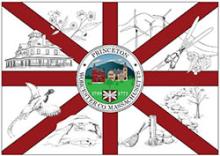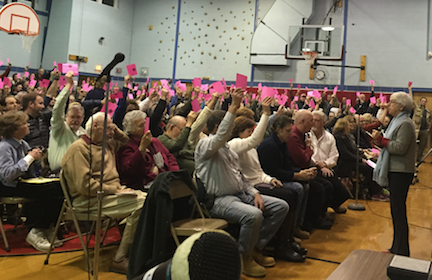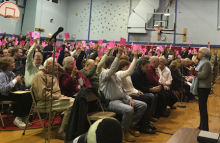
Fast, affordable Internet access for all.

On November 18th, 90% of voters at Princeton's special town meeting approved a measure to fund $1.2 million in make-ready costs bringing the community one step closer to fiber connectivity. The number voters who attended the meeting broke the previous attendance record set 15 years ago by 30%.
We introduced the central Massachusetts town of 3,300 in 2013. The community suffered from poor Internet connectivity negatively impacting its schools, real estate market, and economic development. Since then, the community voted to create a Municipal Light Plant and to appropriate funds to keep the project moving forward.
Community leaders have investigated several options and last fall entered into a relationship with the Matrix Design Group. According to the Memorandum of Understanding [PDF], Matrix will design, build, and operate the FTTH network for a period of 20 years. At the end of that time period, Princeton Broadband Municipal Light Plant has the option of renewing that relationship or purchasing the network for $1.
As their contribution, Princeton will provide rights-of-way, police details during construction, powered telecom shelters, and will pay for utility pole make-ready costs. According to an article in the Landmark:
The make ready work includes replacing approximately 80 utility poles, and moving telephone and electrical lines on 450 poles, providing housing for the electrical components needed to operate the system, and paying for police details during the make ready work.
The borrowing is expected to cost the owner of a home valued at $300,000, about $10 a month or $115 a year increase on their taxes for 12 years. Internet service plus telephone will cost $115 a month. Once a contract is negotiated with Matrix, construction on the make ready phase would start in January 2015 and the project would be completed by January 2016.
It looks like the network will offer Internet connections of 30-50 Mbps; currently options for residents vary from an average 1 Mbps download over Wi-Fi to 1 - 3 Mbps download DSL. According to the PrincetonBroadband.com summary of the deal, 4G LTE in town ranges from 2 - 18 Mbps download. It is not clear if people can purchase a connection faster than 50 Mbps with the current plans.

Preliminary subscription rates are $95 per month for Internet and $115 per month for Internet and voice; video will not be offered. The prices are comparable with what some Princeton residents pay now for much slower "up to" speeds though some do pay less for DSL currently. More detailed info on subscriber costs is also available on the PrincetonBroadband website.
Residents who subscribe during the initial fiber hookup will pay an early discounted installation fee of $250 - $350 if the house is within 250 feet from the road. Early subscribers are committing for two years from the date the network is live. Customers who subscribe later will pay $1,250 - $1,550 to connect.
In compliance with state law, the community must hold a second vote to approve a Proposition 2.5% debt-limit waiver. The town will need to pass the measure by a majority, at which time it will be able to proceed with funding for the make-ready costs. The second vote is scheduled for December 9th. Leverett went through a similar process.
While Princeton's approach minimizes financial exposure, they still carry some risks associated with private ownership of the infrastructure. The network could be sold to a different provider, for instance. From the PrincetonBroadband website:
But we should all be very careful with basing our vote on quibbles with the plan or dreams of a knight in shining armor just around the corner. There are no Plan B’s. There are no other suitors waiting in the wings. Comcast, Charter, and Verizon have even gone so far as to formally decline an offer to come into town. And, doing it ourselves would cost taxpayers over three times more than the Matrix plan would.
…
Compared to any imaginable alternative, the Matrix plan significantly reduces our tax burden, minimizes our town’s risk, maximizes services to the entire town (not just the most densely populated areas), and is future proofed for generations to come.

Voters at the November 18th Town Meeting display pink cards that represent their approval of the Princeton Broadband project. (Thank you to Stan Moss for the photo.)

